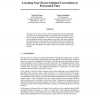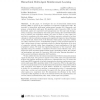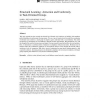88 search results - page 10 / 18 » Learning to Coordinate Actions in Multi-Agent-Systems |
NIPS
2003
13 years 8 months ago
2003
We study how to learn to play a Pareto-optimal strict Nash equilibrium when there exist multiple equilibria and agents may have different preferences among the equilibria. We focu...
HICSS
2009
IEEE
14 years 2 months ago
2009
IEEE
Three training modules were designed to decrease ingroup dynamics in Partially Distributed Teams, which have two or more geographically separated subteams. The action research ori...
IROS
2007
IEEE
14 years 1 months ago
2007
IEEE
— Multi-agent systems (MAS) are a field of study of growing interest in a variety of domains such as robotics or distributed controls. The article focuses on decentralized reinf...
AGENTS
2001
Springer
14 years 1 hour ago
2001
Springer
In this paper, we investigate the use of hierarchical reinforcement learning (HRL) to speed up the acquisition of cooperative multi-agent tasks. We introduce a hierarchical multi-a...
CMOT
1999
13 years 7 months ago
1999
This study extends previous research that showed how informal social sanctions can backfire when members prefer friendship over enforcement of group norms. We use a type of neural...



